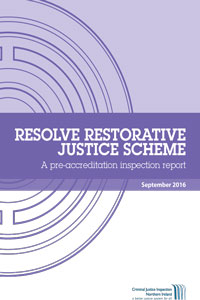Resolve - A pre-accreditation inspection Report
Publication: 22/09/16

Inspectorate finds Resolve community-based restorative justice scheme making 'useful contribution'
An inspection by Criminal Justice Inspection Northern Ireland (CJI) of Resolve a community-based restorative justice scheme operating in east Belfast, has found the scheme was making a useful contribution in a politically complex and fragmented local community.
Inspectors reviewed the scheme, its case files and documentation, to assess its suitability for accreditation by the Department of Justice under the Government's Protocol for community-based restorative justice schemes.
"As part of this independent assessment Inspectors spoke to Resolve's staff and its management committee. They also interviewed clients of the scheme and sought the views of statutory bodies including the Police Service of Northern Ireland, as well as voluntary organisations, community leaders, local politicians and other restorative justice schemes operating in nationalist and unionist areas," said Brendan McGuigan, Chief Inspector of Criminal Justice in Northern Ireland.
Inspectors found the scheme functioned on a small budget and like many of its counterparts, was defined more by its community work ethos than a purely restorative justice model.
Resolve's management committee was made up of representatives from statutory agencies and the local community and minutes of meetings showed evidence of growing professionalism since it became operational two years ago.
Inspectors also heard complimentary feedback from service users in terms of the quality, speed and effectiveness of the solutions achieved in conjunction with Resolve.
"Inspectors found the scheme complied fully with its obligations under human rights legislation including the rights of the child and that the United Nations Principles on Restorative Justice were being observed. It was also providing the police will all the details they required and reacting correctly if offences came to light during the course of its work," said Mr McGuigan.
In conclusion Mr McGuigan said: "Resolve was at an early stage of development therefore Inspectors have made a number of recommendations aimed at improving and consolidating its operational practice, demonstrating its uniqueness and added value. While implementation of the recommendations would be beneficial, they are not critical.
"It is our view Resolve currently meets the standard expected of non-governmental organisations that work with the criminal justice sector. It is suitable to proceed to the second stage of the accreditation process and have its staff considered by the Suitability Panel, where the ultimate decision on accreditation under the Government Protocol rests."